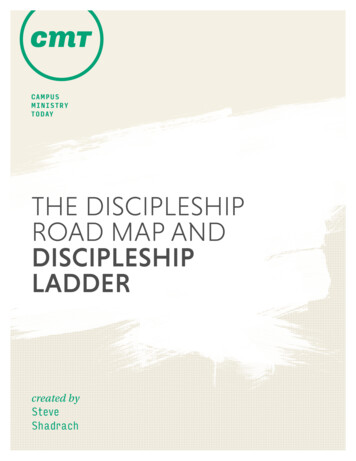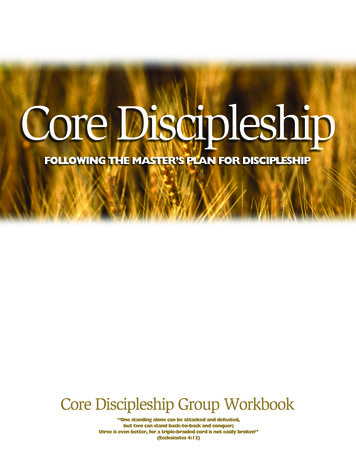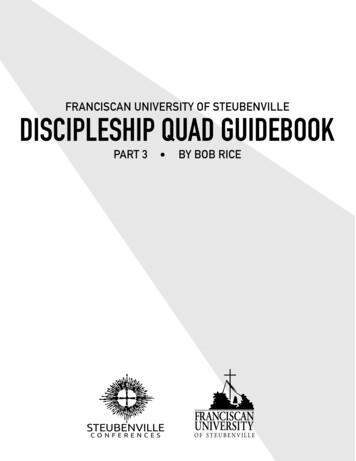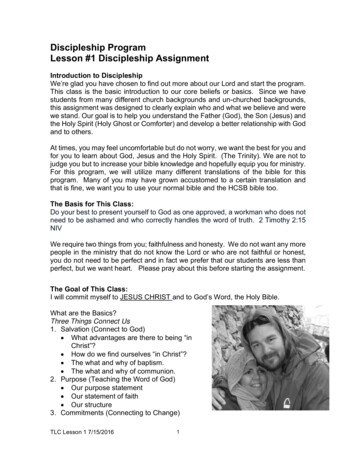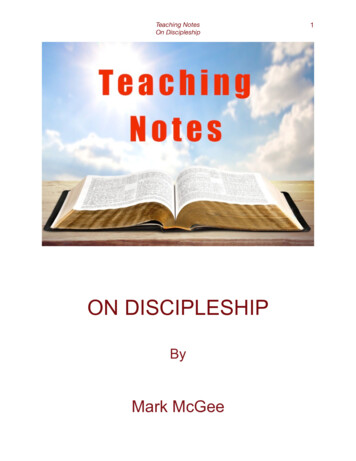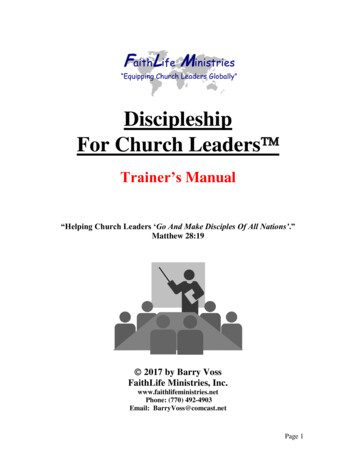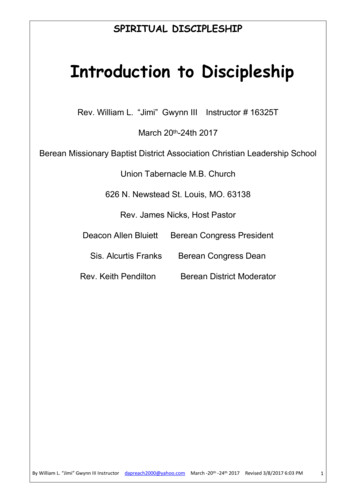
Transcription
The Discipleship SeriesDennisPeacocke
The Copyright Strategic Christian Services 2013DISCIPLESHIPSeriesBecause only disciples change the world!A Series on Practical Christian Livingby Dennis PeacockeWHAT YOU WILL LEARN:yy Christ the perfect disciple: The way, the truth and the lifeyy Discipleship: Training as the critical factoryy Discipleship: Avoiding the pitfallsyy Discipleship: Having ears to hearyy Discipleship: Having eyes to see and a learned tongue
GoStrategic1221 Farmers LaneSuite E, Santa Rosa, CA 95405800-700-0605 707-578-7700info@gostrategic.orgGoStrategic (Formerly Strategic Christian Services)Founded in 1979 by Dennis Peacocke who serves as President, GoStrategic is aprophetic ministry committed to training and equipping leaders of every cultural spherein discipling nations and transforming the world. GoStrategic operates internationally,educating Christians through our Business Leadership School and Strategic Life Trainingcorrespondence schools, events, educational products, networking, and consultingservices. Our ministry headquarters are based in Santa Rosa, California, with affiliatesand schools in Mexico, Central and South America, Europe, Asia, and New Zealand.A former business owner, Dennis Peacocke is the founder andpresident of GoStrategic, a Christian leadership organizationdedicated to demonstrating the relevance of Christianityto every area of contemporary life. He has authored fourbooks: On the Destiny of Nations, Winning the Battle for theMinds of Men, Doing Business God’s Way, and The EmperorHas No Clothes, as well as recorded numerous audio andvideo presentations.Dennis and his wife Jan reside in Santa Rosa, California.They have three adult children and eleven grandchildren.www.gostrategic.org www.businessleadershipschool.org www.strategiclifetraining.com Copyright by GoStrategicGoStrategic equips believers to be leaders in the communities where they live, work,and serve. We specialize in bridging the gap between spiritual truth and the practicalimplementation of those truths in confronting real-world problems. With over threedecades of experience educating, modeling, and connecting like-minded individuals,we have seen first-hand the fruit of Christians applying Biblical principles to themost complex challenges. It is our sincere hope that the services we provide resultin thousands of communities transformed as believers step in to rebuild, repair, andrestore our world. To learn more, please visit our website: www.gostrategic.org
The Discipleship SeriesA Word of WelcomeWhy does the New Testament use the word “disciple” 269 timesand the word “Christian” only 3 times?Why are we told by Christ to make “disciples” of the nations? Copyright by GoStrategicIs your Christianity the life of a true disciple?Welcome as we learn what it takes to become a true follower of Jesus Christ. It is myconviction that “Christians” are not much of a threat to Satan and the standards of thisworld. A true disciple, on the other hand, is not only a threat, but a key to bringingglory to the Father, implementing His standards in this fallen world, and exemplifyingthe life of Christ.This Discipleship Seminar is specifically designed to give you practical tools to workwith on a daily basis that will help you become a true disciple. It will also help youtrain others, your family, friends, and those you care about to truly make a differencefor His kingdom.May the Holy Spirit be present as we seek to learn and practice becoming a true disciple of Jesus Christ.In Him,Dennis T. Peacocke3
The Discipleship Series Copyright by GoStrategic4
The Discipleship SeriesTable of ContentsLesson 1: Following Christ Into His Way, His Truth, and His Life, Part I. 7Lesson 1: Following Christ Into His Way, His Truth, and His Life, Part II. 11Lesson 3: Understanding the Obstacles to Discipleship. 15 Copyright by GoStrategicLesson 4: The Tools of the Disciple: Learning to Hear. 19Lesson 5: The Tool of the Disciple: Learning to Speak and See. 21Recommended Reading List . 25Scriptures on Discipleship. 26Excerpts from The Spirit of the Disciplines. 27Reflective Questions & Suggested Exercises. 295
The Discipleship Series Copyright by GoStrategic6
The Discipleship SeriesLesson 1Following Christ Into His Way, His Truth and His Life(Part One)I.Understanding the goals of this seminar:A. Our first goal is to understand the nature of a disciple and to commit ourselves to becoming one.1.Because He modeled a life of discipleship to the Father, so must we.2.Only disciples change the world. Copyright by GoStrategicB. Our second goal is to begin to understand and commit ourselves to practice the life-styleof a disciple.1.To be in daily training.2.Not to believe we can “make ourselves” (pride fear isolation).3.The end goal is to have a Christ-pleasing life worth imparting.a. The disciples were first called Christians at Antioch.II. Christ has commissioned us to change people and nations. (Matthew 28:18-20)A.Only disciples are used by God to change the world through their faith.1. Definition: A disciple is a whole-hearted follower and student of Jesus Christ, one intraining daily to obey Him and live by the power of His Spirit.2.Jesus defines disciples as those living to obey His commandments. (John 15:10,14)3. He gives many examples of what disciples are and do, found in both the Old Testament (Hebrews 11) and the New (Luke 14:26-35). Luke 14:26-35, for example, lists fiveparticular attributes of disciples:a. Their relational priorities in order (Luke 14:26).b. They embrace personal responsibility and suffering (Luke 14:27).c. They practice strategic living (Luke 14:28-30).d. They wage wise spiritual warfare (Luke 14:31-32).e. Their total resources are available to Christ (Luke 14:33).4.Believers go to heaven; disciples reveal a portion of heaven here on earth.B. Disciples are workers (Matthew 9:35-38), believers who are committed to letting Christ doHis ongoing ministry to the world through them:1.Bringing salvation to fallen individuals.2.Bringing redemption to God-ordained institutions.3.Taking spiritual authority over rebellious spirits and strongholds.7
The Discipleship SeriesC.Disciples are daily working to have a clear historical context for their work and calling:1.The word of God2.Faith and prayer3.Incarnation4.The nature of Law and Grace5.Water & Spirit baptism (cross)6.The Fear of the Lord7.Revelation and testing8.The Priesthood of the believer9.Spiritual authority10. Spiritual warfare11. The Kingdom and the Church12. Love for the truth (destiny, militancy, service, family)The calling of God on you and yours (John 15:16)The distinctive of your stream (I Corinthians 1:13)The work of our generation (Acts 13:36)The foundations of the faith (Hebrews 6:1-5)D. To change the world we begin by changing ourselves: we build inside to outside, small tolarge, natural to spiritual, bottom to top (John 3:3-5; Luke 16:10-12).III. What is a Disciple?A. A disciple is a whole-hearted follower and student of Jesus Christ, one in training daily toobey Him and to live by the power of His Spirit.B.81.Disciples have a Master.2.Disciples copy their Master’s life (I Corinthians 11:1).Jesus clearly defines what we are to follow:1.“I am the way, the truth, and the life; no one comes to the Father but through me.”2.The prize is the Father and we get there by following Christ. Copyright by GoStrategicDiagram One: The Context of Our Work
The Discipleship SeriesDiagram Two: The Three Essentials of Christ’s Lifethe wayFollowing the wayof the Lord Copyright by GoStrategic1. Spiritual disciplinethe truththe lifeOperating through aChristian worldviewLiving in a godlylifestyle (PsALM 90)1. Mental discipline1. Living within your design.a. Imitating the way Christacted in the Scripturesand how your discipler(others) acts.a. Training your mindto understand realityfrom a wholistic andbiblical point of viewa. Understanding andpracticing the life ofcycles, sabbaths, designand limitations.b. This requires study, aworkout plan, and aplace of accountability.b. This requires study, awork-out plan, and aplace of accountability.b. This requires study, awork-out plan, and aplace of accountability.2. Learning to see and studyaway (Psalms 25:8-9; 27:11)requires:a. Webster: “A regularcourse, a means toan end, a determinedcourse or methodology.b. We must understandthe East-West culturaldifference betweenindividualistic instruction(West) and being madeor coached by another(East). Acts 22:4 Examples: Judo, Aikido,Karate-do Elisha-Elijah; EliSamuel; Moses-Joshua;Jesus-the twelve2. Study in Christianworldview (John 8:32)requires:a. A recognition of man’sfallenness: That deception is ournormal point of view. That scripture musttrain our minds to seereality. That the world-systemis in conspiracy to keepour minds in bondage(II Corinthians10:3-5)b. We must studypresuppositionalthinking (Romams12:2) The mind justifieswhat the heart haschosen(Romans1:18-22) We must discover ourspecialty areas anddevelop them.2. Study in how to live a quietand peaceful life (1 Timothy2:2) requires:a. A clear recognition of thesatanic desire to ascendout of our human realmup into the divine. Man is apart from thecreation and a partakerof the divine only inChrist. Being fully man iswhat redemption is allabout.b. We must study thecreated order and trainourselves to live within it. Cycles & seasons(7 days, 7 years, 50years, 4 seasons, etc.) Limits & spheres:ministry, meditation,relationships,priorities and focus,generational transfer.9
The Discipleship Series Copyright by GoStrategic10
The Discipleship SeriesLesson 2Following Christ Into His Way, His Truth and His Life(Part Two)I.Lesson ReviewA. A disciple is a whole-hearted follower and student of Christ, daily in training to life inthe Spirit.B.Believers go to heaven; disciples reveal a measure of heaven here on earth.C.Disciples are following Christ into His ways, His truths and His life-style. Copyright by GoStrategicII. A disciple is a whole-hearted follower committed to training as a way of life.A.Let us firstly deal with some misconceptions about what a disciple is or is not.1.You are not a disciple just because you have a pastor or disciples.2.You are not a disciple simply because you memorize bible verses.3.You are not a disciple simply because you say you are.B. Let us lay out some of the basic philosophy of living which real disciples live by. (A dozenkey attributes).1. They understand and practice the daily use of “use it or lose it.” (Hebrews 5:14; I Corinthians 9:25-27; Matthew 7:23; Hebrews 12:11; Philippians 4:9; Colossians 2:5; I Peter 2:10; I John1:6, 3:10; Deuteronomy 6:4-9; Proverbs 6:20-23.)2. The key words in Proverbs, wisdom and instruction (Proverbs 1:2), literally mean skilland discipline.3.They understand that growth comes from risk and pressure; “no pain-no gain.”4.They understand that responsibility produces ownership.5.They understand the seeking alternative balance between peace and passion.6. They understand that the fastest way to learn is to teach. Disciples are investorsin people.7.Like Jesus, they are believers under authority (Luke 7:8-10).11
The Discipleship Series8.They live to be, “hired by the Lord.” (Matthew 20:1-15)9. They understand that you impart and receive what someone is, not what they saythey are (measles vs. mumps).10. They understand the necessity of building their lives in harmony; body, soul and spirit.11. They understand the necessity of living under the control of their spirit in their spiritual identity (Matthew 16:18), i.e. “Peter” (rock) vs. Simon (wishy-washy).12. Disciples understand that power is guarded by problems:Diagram One: “Power Is Guarded By Problems”PowerWhat is required to solve the problem?problems Knowledge Character ApplicationGreater influenceand power tobring changeIII. Let us examine some of the differences between teaching and training.TheManyA.Teaching is an essential and biblical form of sharing knowledge (I Timothy 3:2, 4:11; Mat-thew 28:18-20)1. Teaching primarily is a methodology of verbally communicating concepts, the meaning of words or ideas to the listener, without necessarily requiring the listener to respondwhile the information is being shared.2.The usage of the information is then left up to the listener.3. The methodology primarily uses the mind, the hearing and little to none of the facilities of the body, soul, or spirit.SmallGroup12B. Training is also an essential biblical form of learning, but is significantly different thanteaching. (Proverbs 22:6 example: the Hebrew-Chaldee word origin is “Chanak” and means tonarrow or restrict.)1.“Teaching” is more frequently associated with the Western mode of instruction.2.The following diagram should be helpful: Copyright by GoStrategic1. Proper analysis (roots)2. Knowledge and use of tools3. Character requirements
The Discipleship SeriesDiagram Two: “Training Contrasted With Teaching”“Teaching”level 1: Copyright by GoStrategiclevel 2: TalkListen Thinkvs.vs. Personallythink through Wrestle with or lose itvs.“TRAINing” Talk Listen Watch You do it(wrestle with it) Trainer corrects Think Watch Do Do Think about Practice Demonstrate Adjustlevel 3: Think aboutvs. Practice until concept is an action and the action is a reflex (character)level 4:Teaching requires listening skillsand self-teaching to applyvs.Training involves coaching to see and alter: Misunderstanding MisapplicationIdentifies tendencies and patterns of strength and weakness out ofwhich comes a workout plan to build on!level 5:Informationvs.Incarnation13
The Discipleship Series Copyright by GoStrategic14
The Discipleship SeriesLesson 3Understanding the ObstaclesTo DiscipleshipI.Lesson Review Copyright by GoStrategicA. A disciple is a whole-hearted follower and student of Christ, daily in training to life inthe Spirit.B.Believers go to heaven; disciples reveal a measure of heaven here on earth.C.Disciples are following Christ into His ways, His truths and His life-style.D.Disciples live out and seek out training and the use and correction of their truths.E.Disciples know that power (service to Christ) is guarded by problems.F.Disciples utilize and understand the differences between teaching and training.II. Let us examine some of the major obstacles to discipleshipA.Effective training reveals how we see, hear, speak and respond under evaluation.1. Listening is passive in the untrained listener. Note-taking reveals at least a primarycommitment to usage.2.B.Obstacles are revealed when training is required.Let us examine some of the obstacles in the following diagram (see next page).15
The Discipleship SeriesDiagram One: Obstacles to DiscipleshipIn The Discipler1. “Religion”In The Disciple1. “Religion”yy teaching w/otrainingyy wants form, notchangeyy knowledge w/oincarnationyy thinks knowing isbeing2. Insecurity: fear ofbeing challengedyy focus ontechniqueyy “judge not”3. Fear ofresponsibilityyy unwillingness tostand aloneyy unbelief in theirtechniquesyy defense mustprecede offense oryou’ll be afraid tofight or declare aresult!162. Antinomianismyy misuse of Matt.7:1-5yy fear of changingold habits(identity)yy building ourown kingdom vs.releasing sonsyy wants appearance(numbers; money)yy correction vs.rejectionyy rebellion3. Creatingdependency1. “Religion”In the Culture1. Illusion vs.substanceyy Greek vs. Hebrew2. Hateyy ridicule, rejection,condemnationyy the law revealsthe need for grace(change)3. Religiousisolationyy by building for thechurch, not thekingdom3. Welfarism andtyranny of thestateyy minimization ofrisk so as to createdependencyand lessen theconsequences ofsin. Copyright by GoStrategicyy ignorance ofhow to justify ordemonstrate2. Fear of evaluationIn the Church
The Discipleship SeriesI.Techniques are not mastered without a constant practice of basicsA.B.New or more complex truth is build on old, basic, proven truths (Matthew 13:52).1.Excellence is built on the “cantilever principle.”2.Deception is to leave your roots or bases for anything!3.The best way (style) is the one you know (assuming it is God).Basic work-out routines for disciples should include:1. A constant review of essential biblical truths and how to use their major applicationin your life (see lesson #1, diagram one). Copyright by GoStrategic2. A recognition that spiritual change (offense) is built on knowing how to block sin(defense). What is still mastering you? (Genesis 4:7)3.My “work-out” involves the above plus (“Hurts of Life”):a. Daily prayer and studying the wordb. A daily application of the principles of: The sovereign choices of Godc. The laws of sowing and reapingWe stand beforeman as we standbefore God Staying clear from bitterness Exercising judgment Properly responding to spiritual authorityd. Seeking to walk as a warrior and a worshipper17
The Discipleship Series Copyright by GoStrategic18
The Discipleship SeriesLesson 4The Tools of the Disciple:Learning to HearMatthew 13:11-23Isaiah 11:1-3; 50:4-5I.Lesson Review: Copyright by GoStrategicA. A disciple is a whole-hearted follower and student of Christ, daily in training to life inthe Spirit.B.Believers go to heaven; disciples reveal a measure of heaven here on earth.C.Disciples are following Christ into His ways, His truths and His life-style.D.Disciples live out and seek out training and the use and correction of their truths.E.Disciples know that power (service to Christ) is guarded by problems.F.Disciples utilize and understand the differences between teaching and training.G.Training, more than simply teaching, reveals where people are really at.H.Disciples train off their basics as they move into new things.II. The tools of the disciple: Learning how to hear: (Isaiah 50:4-5)A.Here are the major obstacles that keep us from being able to hear:1. By moving so fast that the “traffic” of our activity keeps our “spiritual ears” plugged(Matthew 13:22).a. The issue of a demonic culture that demands constant excitation and noise so asto keep us from slowing down to truly hear, and ask the right questions. (Critical needfor Sabbaths!)b. Speed destroys the ability to even ask the right questions (Isaiah 40:31).c. Elijah learned the ability to hear by listening for the still, small voice (I Kings 19:12)more than the excitement of the storm.2. By listening without any active commitment to apply what you’re hearing so that youdon’t wrestle with it and therefore quickly forget it (James 1:22-24).19
The Discipleship Seriesa. We must use it or lose it.b. Practice makes permanent.c. Unapplied truth undermines and destroys the strength of the truth you alreadyhave (Mt 13:12) because of the law of spiritual prosperity. We must value the word ofthe Lord!3. By listening with an untrained wandering mind instead of seeking God for the grace ofa listening ear (Isaiah 50:4). Listening requires a daily routine, “morning by morning.”4. By listening to the wrong people, that is, not knowing who to listen to and who notto listen to.a. My example of “rabbit ears.”b. We listen to those we know by experience and revelation and are our counselors(root structures).d. This brings into play the whole issue of God being a systematic builder (Isa 28:910) and the necessity of not running around the “spiritual gym” giving ourselves hernias because we’re listening to Satan’s work-out routine for us! (teaching reference:“No More Spiritual Hernias”)B.Let us now examine some of the positive characteristics of hearing:1.We have learned to hear God’s word against ourselves.a. We listen with an unprotected heart when the Spirit says it’s Him.b. We confirm our need for openness through trusted, related council (roots).c. We recognize that fear of change, habits, and the lack of willingness to “restockour shelves” operates in us as an obstacle to our hearing God. “I was not disobedient.”(Isa 50:5)2. We have learned not to reject either the message or the messenger because whatthey say isn’t what we want to hear or it was said in a way we may not want to hear.3. We have learned, as good Bereans, to check what we hear against God’s word (Acts17:16-11).4. We have kept a written record of what has proven to have been said to us by God inthe past, and we measure new words against it as a point of consistency and alignment.5. We listen for God’s word to be confirmed in the mouth of two or three reliable witnesses (Deut 17:6; I Jo 5:8).20 Copyright by GoStrategicc. We listen to those who can demonstrate the truth of what they are saying and canshow that it works rather than it being merely theory.
The Discipleship SeriesLesson 5The Tools of theDisciple:Learning to Speak and SeeI.Lesson Review: Copyright by GoStrategicA. A disciple is a whole-hearted follower and student of Christ, daily in training to life inthe Spirit.B.Believers go to heaven; disciples reveal a measure of heaven here on earth.C.Disciples are following Christ into His ways, His truths and His life-style.D.Disciples live out and seek out training and the use and correction of their truths.E.Disciples know that power (service to Christ) is guarded by problems.F.Disciples utilize and understand the differences between teaching and training.G.Training, more than simply teaching, reveals where people are really at.H.Disciples train off their basics as they move into new things.I.The skill of learning is cultivated by knowledge, practice, and obedience.J.Listening involves knowing who to listen to and who not to listen to.K. Godly speech involves bringing both our inner and outer conversation under God’scontrol.L.Only in the power if the Holy Spirit can we truly see clearly.II. The tools of the disciple: learning how to speak (Proverbs 18:21)A.We must understand that speaking involves both an outer and inner conversation.1.With our outer conversation we communicate to others.2.With our inner conversation we communicate to ourselves.3.We think in word conversations so this issue determines the course of our actions.21
The Discipleship SeriesDiagram One: How Actions are Builtstimulus our inner conversation will/emotions declaration (outer conversation) actionB.Let us first examine some of the issues involved with our inner conversation.1.We think in words and sentences, we feel in emotions.2. What we think (speak) internally may or may not be aligned with what we are sayingin our outer conversation. The bible describes the inner conversation as “thinking in ourhearts” (Proverbs 23:7; Matthew 5:28, 3:9).3. Unbelief, duplicity, and confusion are generated by the differences between my inner and outer conversations.The following diagram should be helpful:Diagram Two: Inner-Outer Conversation AlignmentJesus, by the Spirit,tuned into people’sinner conversationsWhat I say to myself Unbelief doublemindedness “It didn’t work last time”(James 1:6-8) Duplicitousness “With a brick!” Confusion “I wish I were home”vs.What I say to others “I’m healed in Jesus” “The Lord bless you” “I’m here to serve you”5. The goal of a disciple is to bring the inner and outer conversation in alignment underGod. Friendship or authenticity is measured by that agreement and we often sense whensomeone is not telling us the truth, i.e. what they’re saying on the inside.6. The “tongue of a disciple” (Isaiah 50:4) begins on the inside and sets the course for theouter tongue and hence the body (James 3:1-12).22 Copyright by GoStrategic4.
The Discipleship SeriesC. As we all know, the bible is full of insight and admonitions on how our tongue (outer conversation) controls our lives. Proverbs especially focuses on the “skill and discipline” of usingour tongues properly.1.Our faith is directed by what we say. (Romans 10:10,13,17)2. As we have already seen, our goals are established by our speaking and made clearby our written speaking (Habakkuk 2:2). Copyright by GoStrategicD. Our ability to make and empower covenants (shalom) is built upon clear speaking and thesetting of our wills and faith in God’s grace to fulfill the promises we make.1.Powerful promises are built on alignment of the inner-outer conversation.2.Promises are built on free agreement to abide by the talked through rules.III. The tools of the disciple: learning how to see: (Isaiah 11:1-3)A.Let us first deal with obstacles to our seeing clearly (five major things).1.Practicing sin obscures our vision.2. What is inside us largely determines the clarity or obscurity of our vision (see teaching: “Discerning the Fundamental Nature of People and Things”)a. Fear clouds our vision (projection)b. Undue speed or haste clouds our vision (carelessness)c. Personal ambition clouds our vision (unsanctified ambition)d. False expectations cloud our vision (unclarified agreements)e. Wanting things to be the way we want it clouds our vision (idealism)B.Let us now discuss two vital attributes that allow us to see clearly.1.We have what is called, “perspective.”2.There are two principle ways to gain perspective.a. To separate ourselves from the system or things that distract us. Examples: Abraham, Moses, The Prophets, David, John the Baptist, Paul. (Disengagement)23
The Discipleship Seriesb. To deeply study what we see against the word of God, and to let the word show usthe signs of hidden things. (Proverbs: if you see or hear this, this is what that means).3.The following diagram should help us:Diagram Three: Seeing the Big Picture (Perspective)1. The “system” or major attitudes of the person or thing2. The methodology of the person or thing Motives: Am I here totake or give? (Isaiah 50:4:“sustain the weary”) Responsibility: If it is myjob, grace is there to seeclearly.IV. Conclusions:241.We have been exposed to these ideas (teaching).2.If you use them (train with them), you’ll see how they work.3.Disciples will train. Copyright by GoStrategic3. The particular mechanics ofthe person or thing WhatIssuesthere is vs. what Iwant to be there
The Discipleship Series Copyright by GoStrategicRecommended Reading List: Discipleship1.Discipling the Nations, Richard De Ridder. Grand Rapids, MI: Baker Book House, 19752.The Training of the Twelve: Timeless Principles for Leadership Development,A.Bruce. Kregel Classics, 2nd Edition. March, 20003.The Radical Wesley & Patterns for Church Renewal, Howard Snyder. Wipf & Stock Publishing19964.Disicples are Made Not Born, Walter A. Henrichsen. Wheaton, Ill: Victor Books5.The Master Plan of Evangelism, Robert E. Coleman. Old Tappan, NJ: Fleming H. Revell Company6.The Cost of Discipleship, Dietrich Bonhoeffer. New York, NY: MacMillan Publishing Co., Inc.7.Dedication and Leadership, Douglas Hyde. Notre Dame, IN: University of Notre Dame Press8.Spiritual Authority, Watchman Nee. Manassas VA: Christian Fellowship Publishers, Inc.9.The Radical Wesley Reconsidered, Bangor Christian Trust and Methodism, Bangor ChrisitanTrust Publications10. Down to Earth Discipling: Essential Principles to Guide Your Ministry, Scott Morton. NavPress Publishing Group, 200311. Starting Well: A Discipleship Journal Guide to Helping Others Grow in Christ, compiled byHolz R. Adam. NavPress Publishing Group, 200312. Making Kingdom Disciples: A New Framework, Charles H. Dunahoo. P & R Publishing 2005GoStrategic has a wide variety of resources available for Christian growth.Please view all our resources at:www.gostrategic.org25
The Discipleship SeriesDiscipleship ScripturesThe Vision of DiscipleshipMatthew 28:18-20Purpose of DiscipleshipColossians 1:28-29The Way of the LordActs 9:2Acts 18:25-26Acts 19:9-2326 Copyright by GoStrategicSteps to MaturitySelection: Luke 6:13Association: Matthew 28:20Consecration: Matthew 11:29Commitment: Matthew 4:17-20Impartation: John 20:22Self Denial: Mark 10:17-22Matthew 16:24-25Luke 14:26Teachable: Romans 13:1-7Obedience: II Timothy 3:1-5Demonstration: John 13:15Imitation: I Corinthians 11:1-3Release: Ephesians 5:21–6:3Delegation: Matthew 4:19Submission: Hebrews 13:7-17Supervision: Mark 8:17Reproduction: John 15:16Fatherhood: John 8:28Death: John 12:24 -26
The following excerpts are reprinted by the author’s permission from:The Spirit of the Disciplines: Understanding How God Changes Livesby Dallas Willard, San Francisco: Harper and Row, 19881. Discipleship: For Super-Christians Only? and training in obedience from no intelligible Copyright by GoStrategicThe word “disciple” occurs 269 times in the NewTestament. “Christian” is found only three timesand was first introduced to refer precisely to thedisciples. The New Testament is a book aboutdisciples, by disciples, and for disciples of JesusChrist.But the point is not merely verbal. What is moreimportant is that the kind of life we see in theearliest church is that of a special type of person.All of the assurances and the benefits offered tohumankind in the gospel evidently presupposesuch a life and do not make realistic sense apartfrom it; The disciple of Jesus is not the deluxe orheavy-duty model of he Christian - especiallypadded, textured, streamlined, and empoweredfor the fast lane on the straight and narrow way.He stands on the pages of the New Testament asthe first level of basic transportation in the Kingdom of God.2. Undiscipled DisciplesFor at least several decades the churches of theWestern world have not made discipleship acondition of being a Christian. One is not requiredto be, or to intend to be,
DISCIPLESHIP Series Because only disciples change the world! A Series on Practical Christian Living by Dennis Peacocke WHAT YOU WILL LEARN: y Christ the perfect disciple: The way, the truth and the life y Discipleship: Training as the critical factor y Discipleship: Avoiding the pitf
